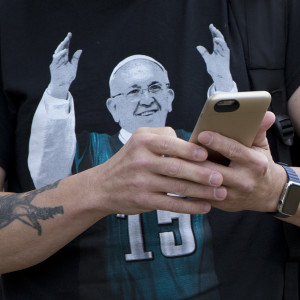As Pope Francis descended upon our nation’s capital, seas of onlookers with their smartphones and tablets in hand eagerly shared their images and commentary on Facebook and Twitter with millions of people online to capture the excitement of his visit. While this behavior seems rather familiar in today’s digital world, it should also serve as a testament to the rapid evolution of mobile connectivity and its immersive impact on how we live our lives.
Rising consumer demand for the capabilities enabled by mobile connectivity necessitates the development of new and more efficient technologies. This need for innovative solutions stems from the fact that spectrum, the limited resource that mobiles devices run on, is becoming increasingly scarce because we’re using more mobile data ever before.
According to a report by Cisco, almost half a billion new mobile devices—88 percent of which were smartphones—were added in 2014, and mobile data traffic in 2014 was nearly 30 times the size of the entire global Internet in 2000.
Unfortunately, corporate behemoths Google and Comcast are leveraging their vast resources and political ties in Washington, D.C. to try to stop a new technology called LTE-U that could work alongside Wi-Fi to give consumers a better, more reliable wireless experience. Both Wi-Fi and LTE-U use unlicensed spectrum, which is a type of spectrum that is ideal for innovation and experimentation for new wireless technologies because it is open to all and is subject to less government regulation. Many experts agree that giving consumers the opportunity to utilize both services could relieve some of the wireless congestion that is likely to arise as Americans increasingly rely on their mobile devices to stay connected anywhere at any time.
Let’s be clear: Wi-Fi is great when it works well. However, we’ve all been in coffee shops or certain offices where the quality of our Wi-Fi connections has been slow or unreliable, and the experience can be incredibly frustrating to say the least.
So why are Google and Comcast opposed to something that could actually bolster the reliability of consumers’ wireless online experience? The reality is that big cable essentially has a monopoly on your Wi-Fi services, and despite the fact that new wireless services could help alleviate the looming spectrum crunch, these corporations don’t want anyone to offer alternative services that could actually make consumers better off.
Our position is that consumers should not be denied access to innovative technologies simply because corporate giants are afraid of a little competition in the wireless space. Relentless innovation with wireless spectrum has fostered the creation of things we now take for granted like baby monitors, Bluetooth, wireless mics, and keyboards as well as more enhanced telemedicine services we are just beginning to utilize. There’s no telling what invention will change the world next.
Allowing Google and Comcast to impede a process that has been so vital in the evolution of our digital world benefits no one except corporate interests – all coming at the cost of a better outcome for consumers. Services that creatively use unlicensed spectrum like LTE-U could be the next step forward in wireless, but if these self-serving companies have their way, we’ll never know the limitless possibilities that could have been.

